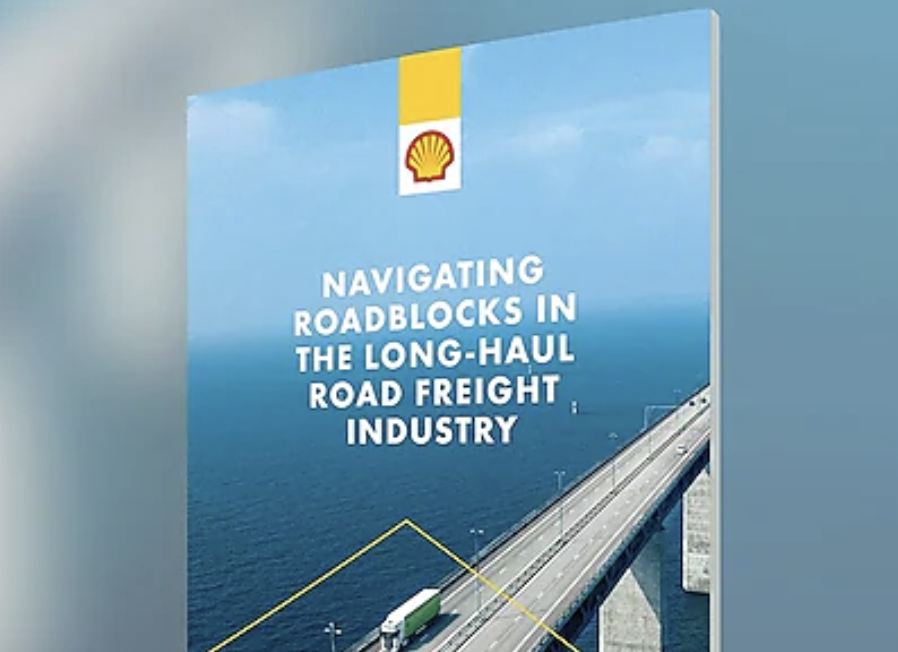Shell and Frost & Sullivan have published a new whitepaper, Navigating Roadblocks in the Long-Haul Road Freight Industry, which sheds light on the status of the commercial road freight industry, as the world responds to the COVID-19 pandemic.
The whitepaper examines key developments within the industry, from how digitalisation is advancing a new generation of fleet management solutions, to the role sustainable practices and decarbonisation strategies will play in futureproofing operations.
It offers valuable insights to fleet professionals, helping them to better position themselves for the future.
Alongside developments that are driving growth, Frost & Sullivan also identifies the top challenges faced by the road freight industry today:
This includes the decline in the availability of skilled drivers that has resulted in driver shortages and skills gaps. To address these concerns, fleet managers should utilise data-driven fleet management solutions, like telematics, which can help facilitate decision making for drivers and fleet managers and encourage safer driving practices. It can also help to maximise efficiency through optimising operations and identify opportunities to improve performance.
The white paper reveals that reducing operational expenses is essential in an uncertain economic climate. However, many fleets are yet to explore AI-driven fleet management services such as predictive maintenance, which can reduce breakdowns by 70% or more, and digital freight brokerage solutions, which minimise efficiency losses through improved utilisation and load optimisation.[1] Studies also suggest that predictive maintenance could reduce maintenance costs by up to 30%2, and in certain cases, the use of high-quality, differentiated fuels and lubricants can generate economy savings of 8.9% [3].
Regarding decarbonisation, over 70%[4] of industry respondents noted that this was their organisations’ leading, or one of their top three priorities. In order for fleets to operate more sustainably, while remaining profitable, there is the opportunity to invest in short-to-mid-term solutions such as LNG, BioLNG and biofuels. The transition to alternative powertrains such as battery electric and hydrogen vehicles will be critical to decarbonisation in the longer term.
Regarding security – 65%[5] of fleet managers consider fraud as a problem for their business. To protect their businesses and limit threats to profitability, fleets should embrace digital fleet management tools, like payment monitoring, which enables full visibility of expenditure and geo-fencing to limit the risk of security breaches.
Patrick Carré, Vice President of Commercial Road Transport at Shell, said: “Achieving an interconnected and more sustainable future requires collaboration with customers, partners and stakeholders. At Shell Fleet Solutions, we are committed to helping customers navigate shifts in the industry, by providing digital fleet management tools like Shell Telematics, streamlining tolling payments in Europe and increasing access to low emissions fuels, like LNG, BioLNG, hydrogen fuel cell and battery electric vehicles. These offers are designed to help fleets optimise their total cost of ownership (TCO) and improve security and convenience across operations with on the road services, while advancing sustainability goals.”
1 Cost saving tips beyond fuel savings: Properly timing maintenance” Fleet Answers, http://www.fleetanswers.com/content/cost-saving-tips-beyond-fuel-saving… (19/10/2018) 2 Making Fuel Work for your Bottom Line: Overcoming the false economy that standard fuels can help the road transport sector reduce Total Cost of Ownership. Shell Commercial Fuels (2018) 3 Making Fuel Work for your Bottom Line: Overcoming the false economy that standard fuels can help the road transport sector reduce Total Cost of Ownership. Shell Commercial Fuels (2018) 4 Shell, “Decarbonising Road Freight: GETTING INTO GEAR – Industry Perspectives”, https://www.shell.com/promos/energy-and-innovation/decarbonising-road-f… (2021) 5 Edelman Fleet Manager Survey (2016)
Source: https://greenfleet.netCUT COTS OF THE FLEET WITH OUR AUDIT PROGRAM
The audit is a key tool to know the overall status and provide the analysis, the assessment, the advice, the suggestions and the actions to take in order to cut costs and increase the efficiency and efficacy of the fleet. We propose the following fleet management audit.




